MG414 Organisational Behaviour: How Culture Drives Success at Argos
VerifiedAdded on 2023/06/18
|12
|3206
|294
Report
AI Summary
This report examines the influence of organisational culture on employee behaviour and overall success, focusing on Argos. It identifies the company's culture using theoretical models like Handy's, highlighting the role culture plays in enhancing organisational effectiveness through communication, emphasizing the 7C's of effective communication. The report also evaluates the role of culture in staff motivation, applying Herzberg's two-factor theory to illustrate how hygiene and motivational factors impact employee performance at Argos. Finally, it discusses how Argos can leverage its organisational culture to enhance future success, emphasizing the importance of a positive and healthy work environment. This document is a student contribution available on Desklib, a platform offering study tools and resources.
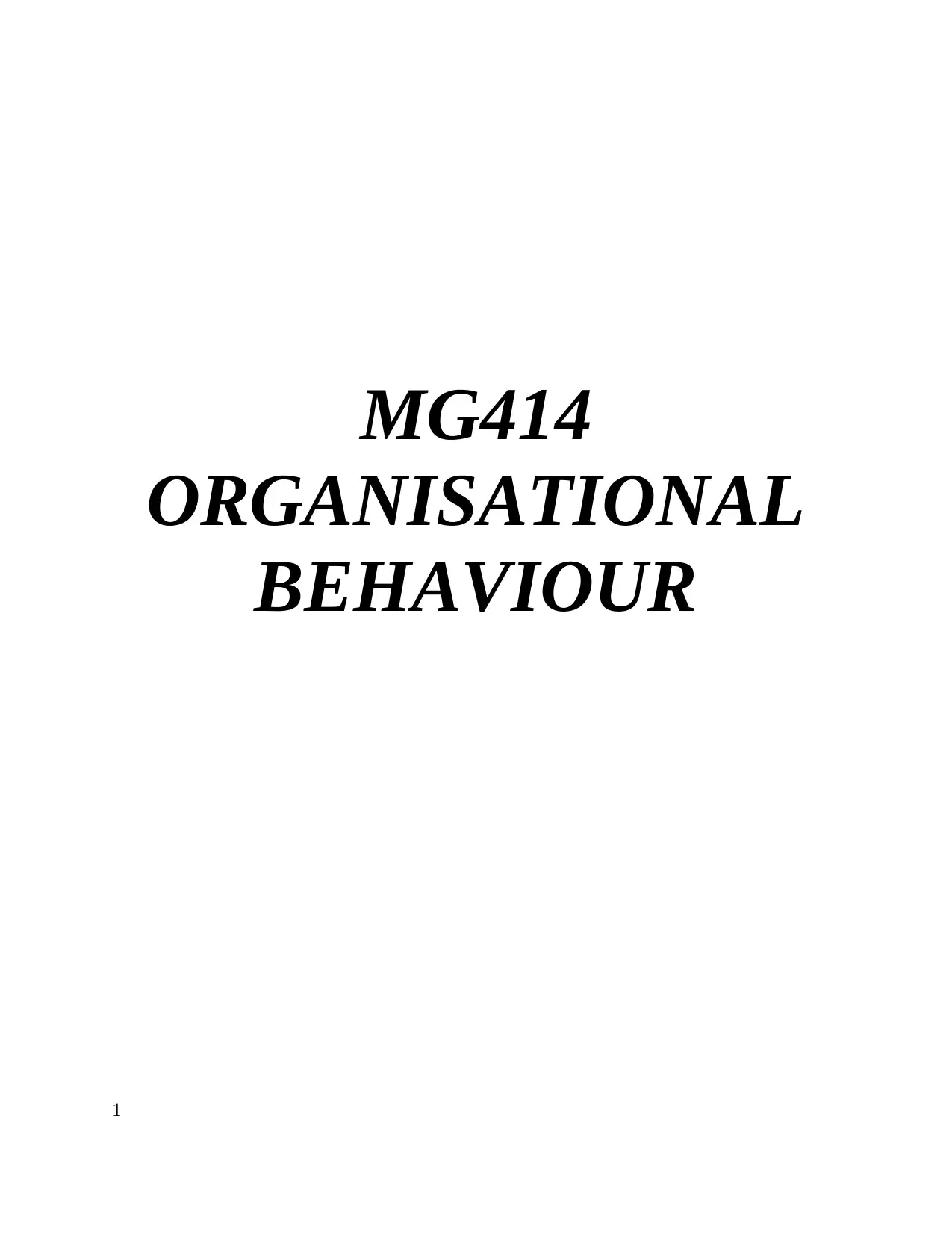
MG414
ORGANISATIONAL
BEHAVIOUR
1
ORGANISATIONAL
BEHAVIOUR
1
Paraphrase This Document
Need a fresh take? Get an instant paraphrase of this document with our AI Paraphraser
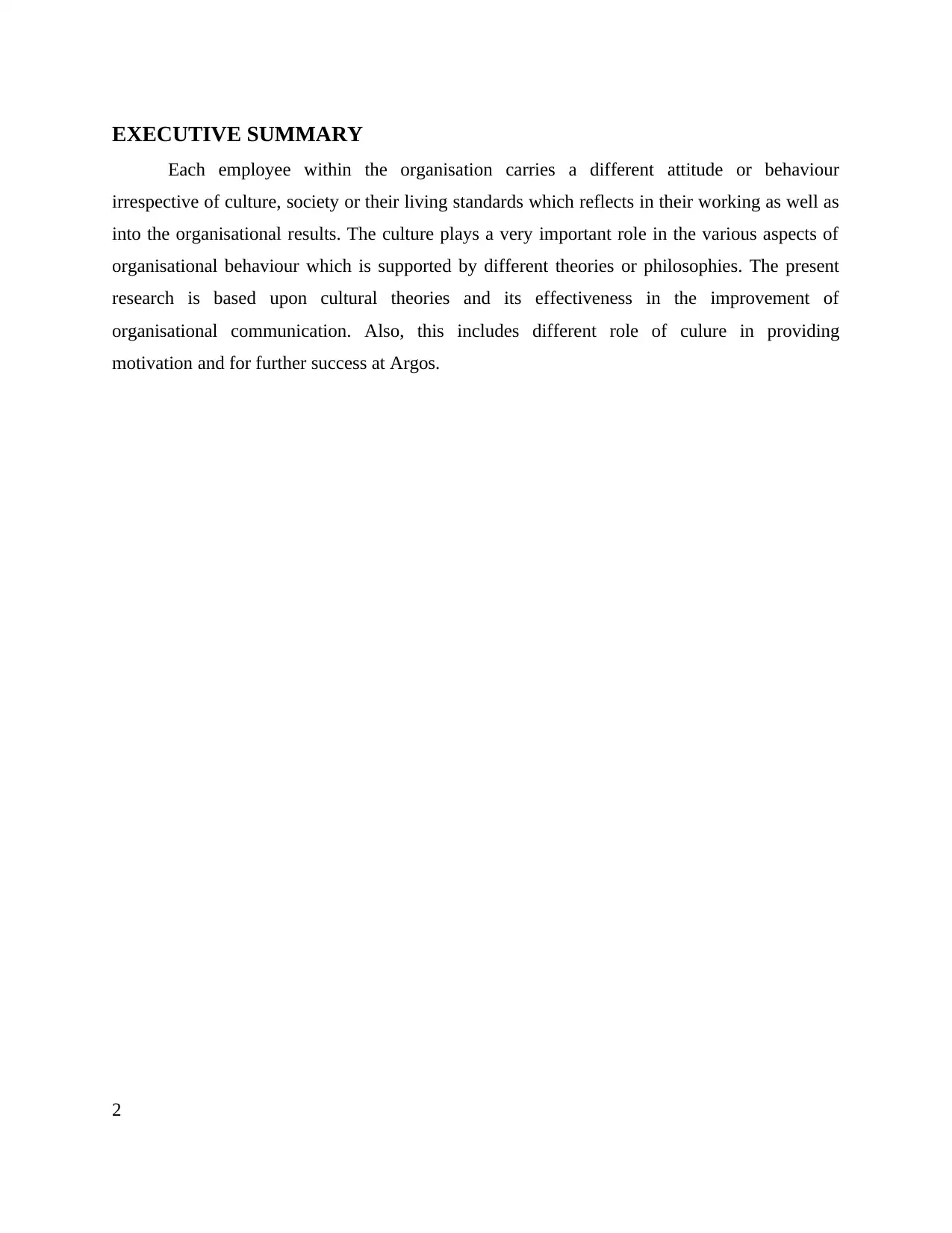
EXECUTIVE SUMMARY
Each employee within the organisation carries a different attitude or behaviour
irrespective of culture, society or their living standards which reflects in their working as well as
into the organisational results. The culture plays a very important role in the various aspects of
organisational behaviour which is supported by different theories or philosophies. The present
research is based upon cultural theories and its effectiveness in the improvement of
organisational communication. Also, this includes different role of culure in providing
motivation and for further success at Argos.
2
Each employee within the organisation carries a different attitude or behaviour
irrespective of culture, society or their living standards which reflects in their working as well as
into the organisational results. The culture plays a very important role in the various aspects of
organisational behaviour which is supported by different theories or philosophies. The present
research is based upon cultural theories and its effectiveness in the improvement of
organisational communication. Also, this includes different role of culure in providing
motivation and for further success at Argos.
2
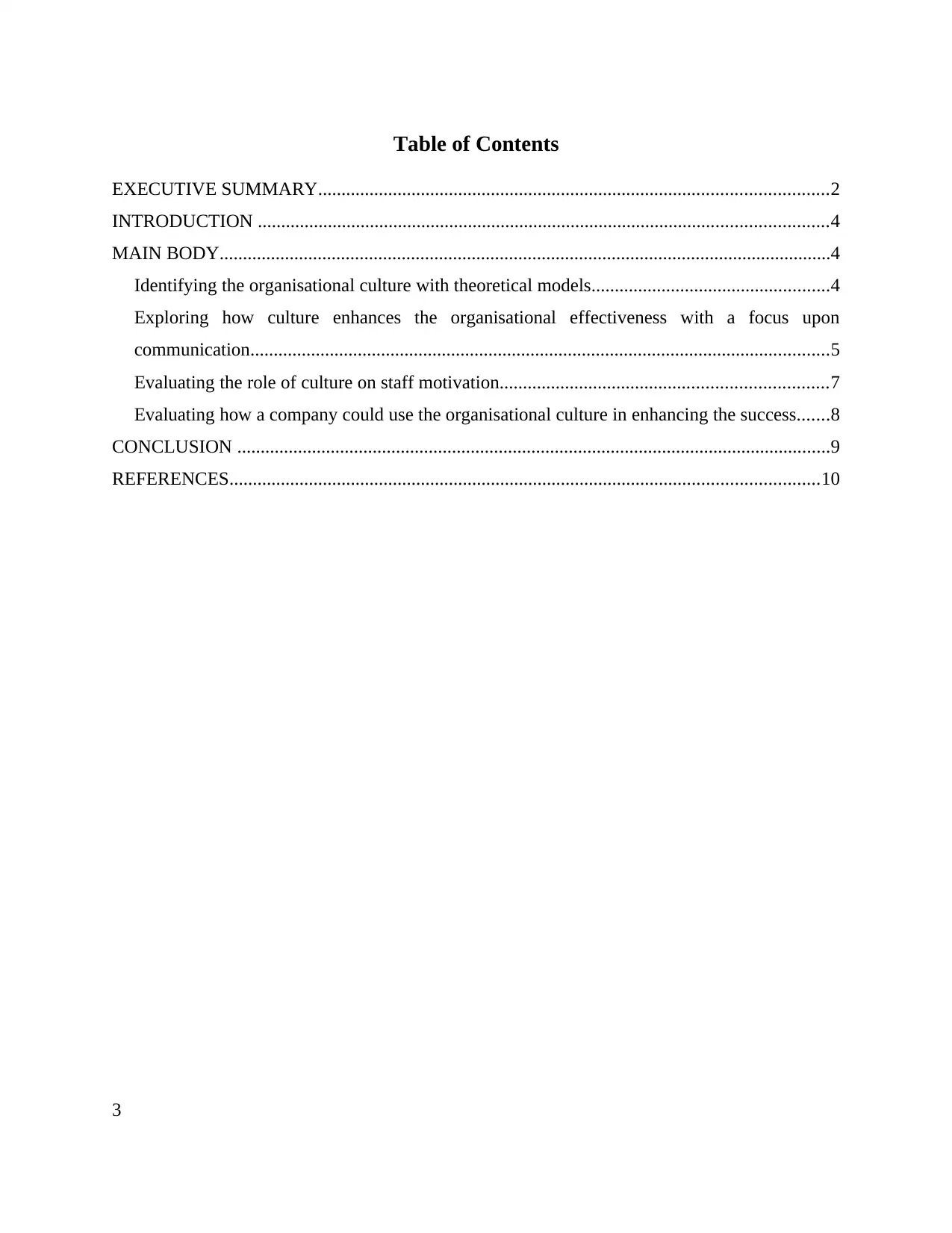
Table of Contents
EXECUTIVE SUMMARY.............................................................................................................2
INTRODUCTION ..........................................................................................................................4
MAIN BODY...................................................................................................................................4
Identifying the organisational culture with theoretical models...................................................4
Exploring how culture enhances the organisational effectiveness with a focus upon
communication............................................................................................................................5
Evaluating the role of culture on staff motivation......................................................................7
Evaluating how a company could use the organisational culture in enhancing the success.......8
CONCLUSION ...............................................................................................................................9
REFERENCES..............................................................................................................................10
3
EXECUTIVE SUMMARY.............................................................................................................2
INTRODUCTION ..........................................................................................................................4
MAIN BODY...................................................................................................................................4
Identifying the organisational culture with theoretical models...................................................4
Exploring how culture enhances the organisational effectiveness with a focus upon
communication............................................................................................................................5
Evaluating the role of culture on staff motivation......................................................................7
Evaluating how a company could use the organisational culture in enhancing the success.......8
CONCLUSION ...............................................................................................................................9
REFERENCES..............................................................................................................................10
3
⊘ This is a preview!⊘
Do you want full access?
Subscribe today to unlock all pages.

Trusted by 1+ million students worldwide
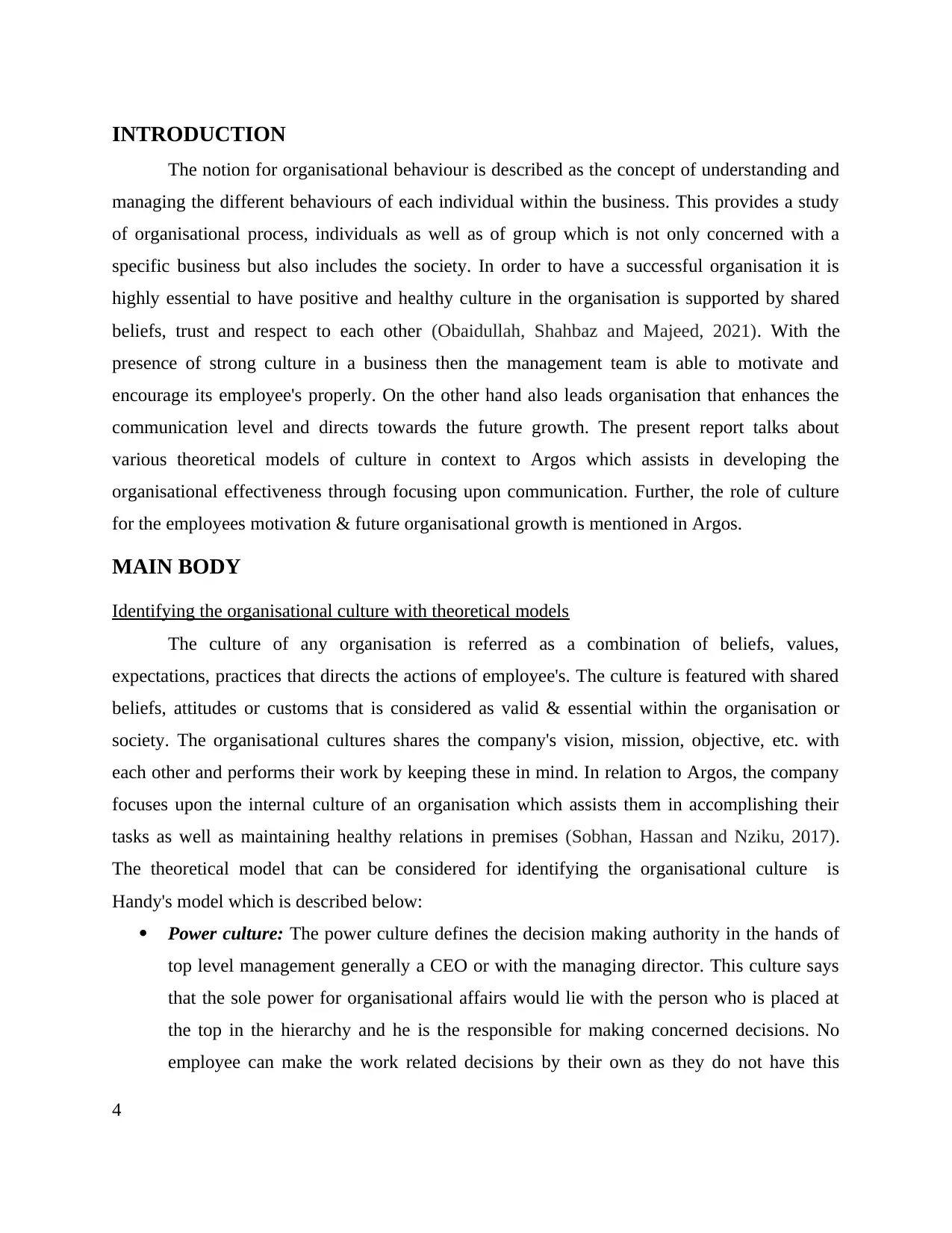
INTRODUCTION
The notion for organisational behaviour is described as the concept of understanding and
managing the different behaviours of each individual within the business. This provides a study
of organisational process, individuals as well as of group which is not only concerned with a
specific business but also includes the society. In order to have a successful organisation it is
highly essential to have positive and healthy culture in the organisation is supported by shared
beliefs, trust and respect to each other (Obaidullah, Shahbaz and Majeed, 2021). With the
presence of strong culture in a business then the management team is able to motivate and
encourage its employee's properly. On the other hand also leads organisation that enhances the
communication level and directs towards the future growth. The present report talks about
various theoretical models of culture in context to Argos which assists in developing the
organisational effectiveness through focusing upon communication. Further, the role of culture
for the employees motivation & future organisational growth is mentioned in Argos.
MAIN BODY
Identifying the organisational culture with theoretical models
The culture of any organisation is referred as a combination of beliefs, values,
expectations, practices that directs the actions of employee's. The culture is featured with shared
beliefs, attitudes or customs that is considered as valid & essential within the organisation or
society. The organisational cultures shares the company's vision, mission, objective, etc. with
each other and performs their work by keeping these in mind. In relation to Argos, the company
focuses upon the internal culture of an organisation which assists them in accomplishing their
tasks as well as maintaining healthy relations in premises (Sobhan, Hassan and Nziku, 2017).
The theoretical model that can be considered for identifying the organisational culture is
Handy's model which is described below:
Power culture: The power culture defines the decision making authority in the hands of
top level management generally a CEO or with the managing director. This culture says
that the sole power for organisational affairs would lie with the person who is placed at
the top in the hierarchy and he is the responsible for making concerned decisions. No
employee can make the work related decisions by their own as they do not have this
4
The notion for organisational behaviour is described as the concept of understanding and
managing the different behaviours of each individual within the business. This provides a study
of organisational process, individuals as well as of group which is not only concerned with a
specific business but also includes the society. In order to have a successful organisation it is
highly essential to have positive and healthy culture in the organisation is supported by shared
beliefs, trust and respect to each other (Obaidullah, Shahbaz and Majeed, 2021). With the
presence of strong culture in a business then the management team is able to motivate and
encourage its employee's properly. On the other hand also leads organisation that enhances the
communication level and directs towards the future growth. The present report talks about
various theoretical models of culture in context to Argos which assists in developing the
organisational effectiveness through focusing upon communication. Further, the role of culture
for the employees motivation & future organisational growth is mentioned in Argos.
MAIN BODY
Identifying the organisational culture with theoretical models
The culture of any organisation is referred as a combination of beliefs, values,
expectations, practices that directs the actions of employee's. The culture is featured with shared
beliefs, attitudes or customs that is considered as valid & essential within the organisation or
society. The organisational cultures shares the company's vision, mission, objective, etc. with
each other and performs their work by keeping these in mind. In relation to Argos, the company
focuses upon the internal culture of an organisation which assists them in accomplishing their
tasks as well as maintaining healthy relations in premises (Sobhan, Hassan and Nziku, 2017).
The theoretical model that can be considered for identifying the organisational culture is
Handy's model which is described below:
Power culture: The power culture defines the decision making authority in the hands of
top level management generally a CEO or with the managing director. This culture says
that the sole power for organisational affairs would lie with the person who is placed at
the top in the hierarchy and he is the responsible for making concerned decisions. No
employee can make the work related decisions by their own as they do not have this
4
Paraphrase This Document
Need a fresh take? Get an instant paraphrase of this document with our AI Paraphraser
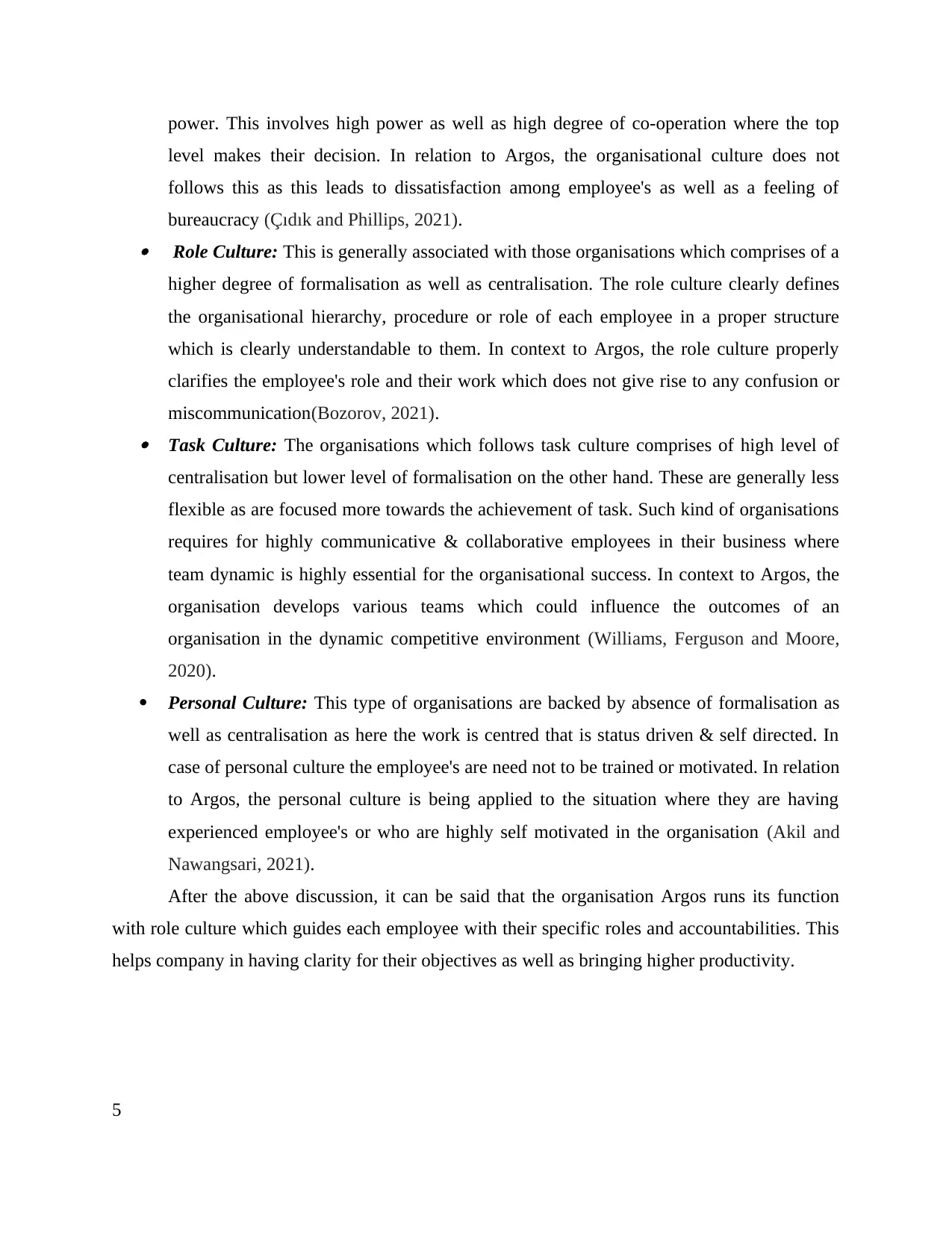
power. This involves high power as well as high degree of co-operation where the top
level makes their decision. In relation to Argos, the organisational culture does not
follows this as this leads to dissatisfaction among employee's as well as a feeling of
bureaucracy (Çıdık and Phillips, 2021). Role Culture: This is generally associated with those organisations which comprises of a
higher degree of formalisation as well as centralisation. The role culture clearly defines
the organisational hierarchy, procedure or role of each employee in a proper structure
which is clearly understandable to them. In context to Argos, the role culture properly
clarifies the employee's role and their work which does not give rise to any confusion or
miscommunication(Bozorov, 2021). Task Culture: The organisations which follows task culture comprises of high level of
centralisation but lower level of formalisation on the other hand. These are generally less
flexible as are focused more towards the achievement of task. Such kind of organisations
requires for highly communicative & collaborative employees in their business where
team dynamic is highly essential for the organisational success. In context to Argos, the
organisation develops various teams which could influence the outcomes of an
organisation in the dynamic competitive environment (Williams, Ferguson and Moore,
2020).
Personal Culture: This type of organisations are backed by absence of formalisation as
well as centralisation as here the work is centred that is status driven & self directed. In
case of personal culture the employee's are need not to be trained or motivated. In relation
to Argos, the personal culture is being applied to the situation where they are having
experienced employee's or who are highly self motivated in the organisation (Akil and
Nawangsari, 2021).
After the above discussion, it can be said that the organisation Argos runs its function
with role culture which guides each employee with their specific roles and accountabilities. This
helps company in having clarity for their objectives as well as bringing higher productivity.
5
level makes their decision. In relation to Argos, the organisational culture does not
follows this as this leads to dissatisfaction among employee's as well as a feeling of
bureaucracy (Çıdık and Phillips, 2021). Role Culture: This is generally associated with those organisations which comprises of a
higher degree of formalisation as well as centralisation. The role culture clearly defines
the organisational hierarchy, procedure or role of each employee in a proper structure
which is clearly understandable to them. In context to Argos, the role culture properly
clarifies the employee's role and their work which does not give rise to any confusion or
miscommunication(Bozorov, 2021). Task Culture: The organisations which follows task culture comprises of high level of
centralisation but lower level of formalisation on the other hand. These are generally less
flexible as are focused more towards the achievement of task. Such kind of organisations
requires for highly communicative & collaborative employees in their business where
team dynamic is highly essential for the organisational success. In context to Argos, the
organisation develops various teams which could influence the outcomes of an
organisation in the dynamic competitive environment (Williams, Ferguson and Moore,
2020).
Personal Culture: This type of organisations are backed by absence of formalisation as
well as centralisation as here the work is centred that is status driven & self directed. In
case of personal culture the employee's are need not to be trained or motivated. In relation
to Argos, the personal culture is being applied to the situation where they are having
experienced employee's or who are highly self motivated in the organisation (Akil and
Nawangsari, 2021).
After the above discussion, it can be said that the organisation Argos runs its function
with role culture which guides each employee with their specific roles and accountabilities. This
helps company in having clarity for their objectives as well as bringing higher productivity.
5
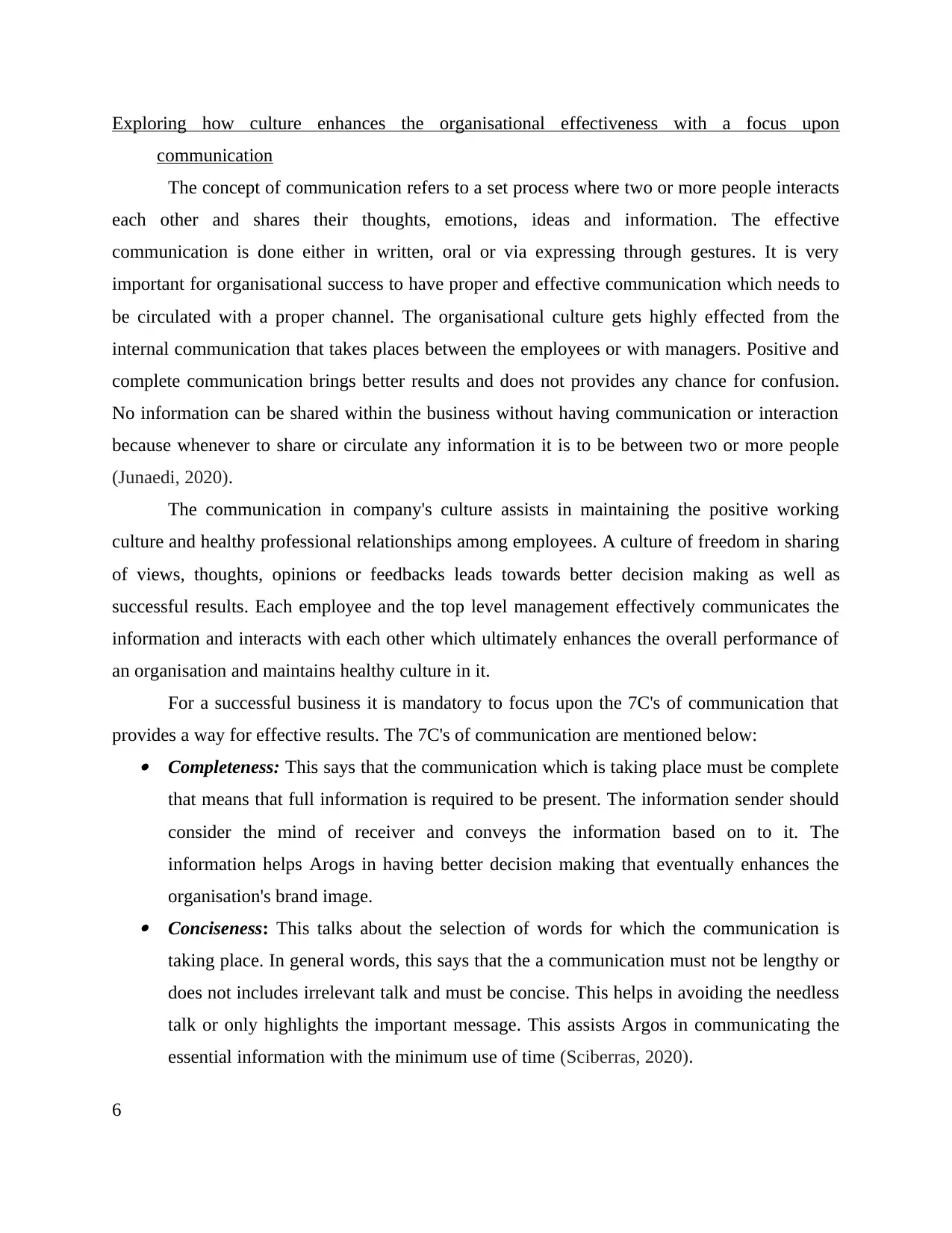
Exploring how culture enhances the organisational effectiveness with a focus upon
communication
The concept of communication refers to a set process where two or more people interacts
each other and shares their thoughts, emotions, ideas and information. The effective
communication is done either in written, oral or via expressing through gestures. It is very
important for organisational success to have proper and effective communication which needs to
be circulated with a proper channel. The organisational culture gets highly effected from the
internal communication that takes places between the employees or with managers. Positive and
complete communication brings better results and does not provides any chance for confusion.
No information can be shared within the business without having communication or interaction
because whenever to share or circulate any information it is to be between two or more people
(Junaedi, 2020).
The communication in company's culture assists in maintaining the positive working
culture and healthy professional relationships among employees. A culture of freedom in sharing
of views, thoughts, opinions or feedbacks leads towards better decision making as well as
successful results. Each employee and the top level management effectively communicates the
information and interacts with each other which ultimately enhances the overall performance of
an organisation and maintains healthy culture in it.
For a successful business it is mandatory to focus upon the 7C's of communication that
provides a way for effective results. The 7C's of communication are mentioned below: Completeness: This says that the communication which is taking place must be complete
that means that full information is required to be present. The information sender should
consider the mind of receiver and conveys the information based on to it. The
information helps Arogs in having better decision making that eventually enhances the
organisation's brand image. Conciseness: This talks about the selection of words for which the communication is
taking place. In general words, this says that the a communication must not be lengthy or
does not includes irrelevant talk and must be concise. This helps in avoiding the needless
talk or only highlights the important message. This assists Argos in communicating the
essential information with the minimum use of time (Sciberras, 2020).
6
communication
The concept of communication refers to a set process where two or more people interacts
each other and shares their thoughts, emotions, ideas and information. The effective
communication is done either in written, oral or via expressing through gestures. It is very
important for organisational success to have proper and effective communication which needs to
be circulated with a proper channel. The organisational culture gets highly effected from the
internal communication that takes places between the employees or with managers. Positive and
complete communication brings better results and does not provides any chance for confusion.
No information can be shared within the business without having communication or interaction
because whenever to share or circulate any information it is to be between two or more people
(Junaedi, 2020).
The communication in company's culture assists in maintaining the positive working
culture and healthy professional relationships among employees. A culture of freedom in sharing
of views, thoughts, opinions or feedbacks leads towards better decision making as well as
successful results. Each employee and the top level management effectively communicates the
information and interacts with each other which ultimately enhances the overall performance of
an organisation and maintains healthy culture in it.
For a successful business it is mandatory to focus upon the 7C's of communication that
provides a way for effective results. The 7C's of communication are mentioned below: Completeness: This says that the communication which is taking place must be complete
that means that full information is required to be present. The information sender should
consider the mind of receiver and conveys the information based on to it. The
information helps Arogs in having better decision making that eventually enhances the
organisation's brand image. Conciseness: This talks about the selection of words for which the communication is
taking place. In general words, this says that the a communication must not be lengthy or
does not includes irrelevant talk and must be concise. This helps in avoiding the needless
talk or only highlights the important message. This assists Argos in communicating the
essential information with the minimum use of time (Sciberras, 2020).
6
⊘ This is a preview!⊘
Do you want full access?
Subscribe today to unlock all pages.

Trusted by 1+ million students worldwide
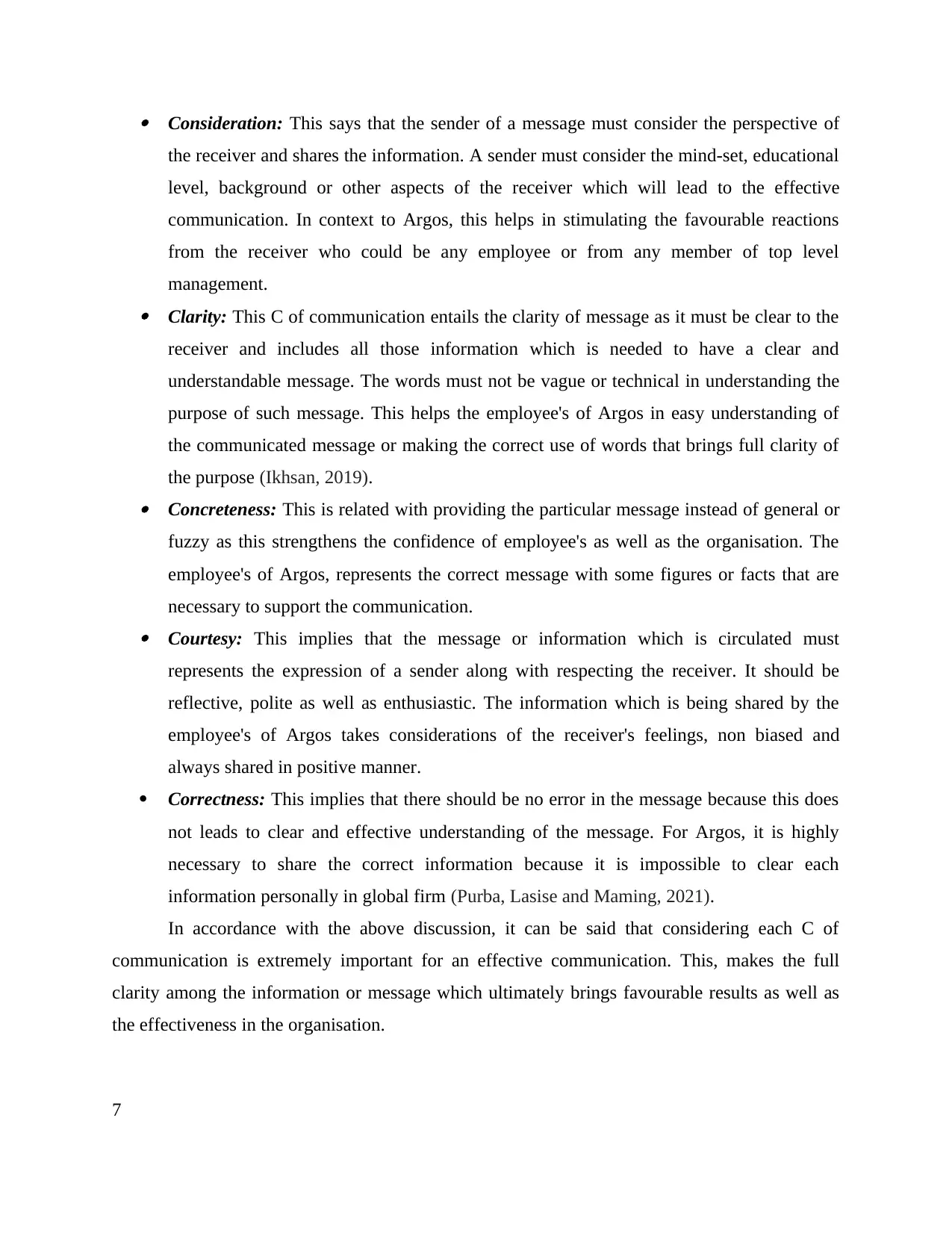
Consideration: This says that the sender of a message must consider the perspective of
the receiver and shares the information. A sender must consider the mind-set, educational
level, background or other aspects of the receiver which will lead to the effective
communication. In context to Argos, this helps in stimulating the favourable reactions
from the receiver who could be any employee or from any member of top level
management. Clarity: This C of communication entails the clarity of message as it must be clear to the
receiver and includes all those information which is needed to have a clear and
understandable message. The words must not be vague or technical in understanding the
purpose of such message. This helps the employee's of Argos in easy understanding of
the communicated message or making the correct use of words that brings full clarity of
the purpose (Ikhsan, 2019). Concreteness: This is related with providing the particular message instead of general or
fuzzy as this strengthens the confidence of employee's as well as the organisation. The
employee's of Argos, represents the correct message with some figures or facts that are
necessary to support the communication. Courtesy: This implies that the message or information which is circulated must
represents the expression of a sender along with respecting the receiver. It should be
reflective, polite as well as enthusiastic. The information which is being shared by the
employee's of Argos takes considerations of the receiver's feelings, non biased and
always shared in positive manner.
Correctness: This implies that there should be no error in the message because this does
not leads to clear and effective understanding of the message. For Argos, it is highly
necessary to share the correct information because it is impossible to clear each
information personally in global firm (Purba, Lasise and Maming, 2021).
In accordance with the above discussion, it can be said that considering each C of
communication is extremely important for an effective communication. This, makes the full
clarity among the information or message which ultimately brings favourable results as well as
the effectiveness in the organisation.
7
the receiver and shares the information. A sender must consider the mind-set, educational
level, background or other aspects of the receiver which will lead to the effective
communication. In context to Argos, this helps in stimulating the favourable reactions
from the receiver who could be any employee or from any member of top level
management. Clarity: This C of communication entails the clarity of message as it must be clear to the
receiver and includes all those information which is needed to have a clear and
understandable message. The words must not be vague or technical in understanding the
purpose of such message. This helps the employee's of Argos in easy understanding of
the communicated message or making the correct use of words that brings full clarity of
the purpose (Ikhsan, 2019). Concreteness: This is related with providing the particular message instead of general or
fuzzy as this strengthens the confidence of employee's as well as the organisation. The
employee's of Argos, represents the correct message with some figures or facts that are
necessary to support the communication. Courtesy: This implies that the message or information which is circulated must
represents the expression of a sender along with respecting the receiver. It should be
reflective, polite as well as enthusiastic. The information which is being shared by the
employee's of Argos takes considerations of the receiver's feelings, non biased and
always shared in positive manner.
Correctness: This implies that there should be no error in the message because this does
not leads to clear and effective understanding of the message. For Argos, it is highly
necessary to share the correct information because it is impossible to clear each
information personally in global firm (Purba, Lasise and Maming, 2021).
In accordance with the above discussion, it can be said that considering each C of
communication is extremely important for an effective communication. This, makes the full
clarity among the information or message which ultimately brings favourable results as well as
the effectiveness in the organisation.
7
Paraphrase This Document
Need a fresh take? Get an instant paraphrase of this document with our AI Paraphraser
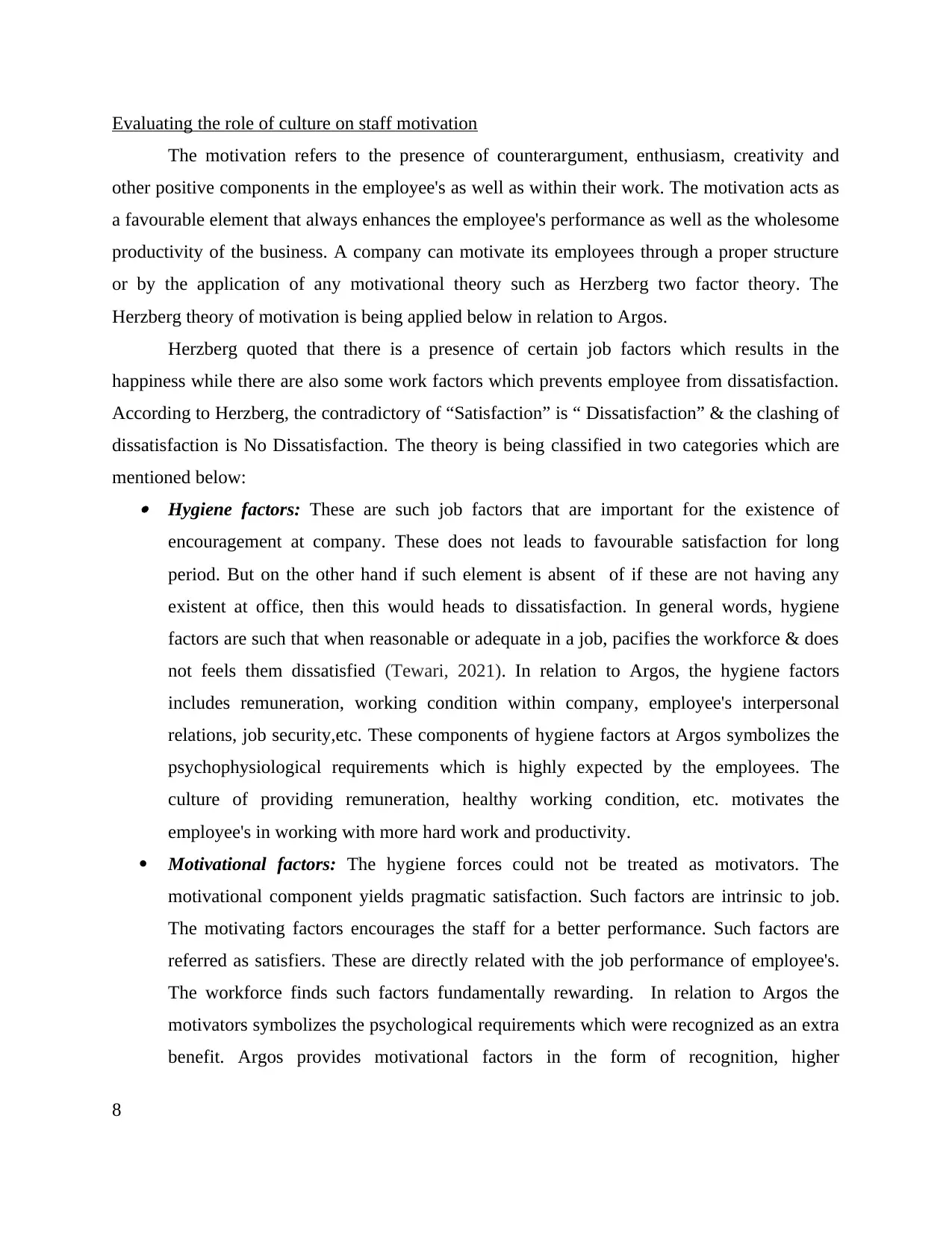
Evaluating the role of culture on staff motivation
The motivation refers to the presence of counterargument, enthusiasm, creativity and
other positive components in the employee's as well as within their work. The motivation acts as
a favourable element that always enhances the employee's performance as well as the wholesome
productivity of the business. A company can motivate its employees through a proper structure
or by the application of any motivational theory such as Herzberg two factor theory. The
Herzberg theory of motivation is being applied below in relation to Argos.
Herzberg quoted that there is a presence of certain job factors which results in the
happiness while there are also some work factors which prevents employee from dissatisfaction.
According to Herzberg, the contradictory of “Satisfaction” is “ Dissatisfaction” & the clashing of
dissatisfaction is No Dissatisfaction. The theory is being classified in two categories which are
mentioned below: Hygiene factors: These are such job factors that are important for the existence of
encouragement at company. These does not leads to favourable satisfaction for long
period. But on the other hand if such element is absent of if these are not having any
existent at office, then this would heads to dissatisfaction. In general words, hygiene
factors are such that when reasonable or adequate in a job, pacifies the workforce & does
not feels them dissatisfied (Tewari, 2021). In relation to Argos, the hygiene factors
includes remuneration, working condition within company, employee's interpersonal
relations, job security,etc. These components of hygiene factors at Argos symbolizes the
psychophysiological requirements which is highly expected by the employees. The
culture of providing remuneration, healthy working condition, etc. motivates the
employee's in working with more hard work and productivity.
Motivational factors: The hygiene forces could not be treated as motivators. The
motivational component yields pragmatic satisfaction. Such factors are intrinsic to job.
The motivating factors encourages the staff for a better performance. Such factors are
referred as satisfiers. These are directly related with the job performance of employee's.
The workforce finds such factors fundamentally rewarding. In relation to Argos the
motivators symbolizes the psychological requirements which were recognized as an extra
benefit. Argos provides motivational factors in the form of recognition, higher
8
The motivation refers to the presence of counterargument, enthusiasm, creativity and
other positive components in the employee's as well as within their work. The motivation acts as
a favourable element that always enhances the employee's performance as well as the wholesome
productivity of the business. A company can motivate its employees through a proper structure
or by the application of any motivational theory such as Herzberg two factor theory. The
Herzberg theory of motivation is being applied below in relation to Argos.
Herzberg quoted that there is a presence of certain job factors which results in the
happiness while there are also some work factors which prevents employee from dissatisfaction.
According to Herzberg, the contradictory of “Satisfaction” is “ Dissatisfaction” & the clashing of
dissatisfaction is No Dissatisfaction. The theory is being classified in two categories which are
mentioned below: Hygiene factors: These are such job factors that are important for the existence of
encouragement at company. These does not leads to favourable satisfaction for long
period. But on the other hand if such element is absent of if these are not having any
existent at office, then this would heads to dissatisfaction. In general words, hygiene
factors are such that when reasonable or adequate in a job, pacifies the workforce & does
not feels them dissatisfied (Tewari, 2021). In relation to Argos, the hygiene factors
includes remuneration, working condition within company, employee's interpersonal
relations, job security,etc. These components of hygiene factors at Argos symbolizes the
psychophysiological requirements which is highly expected by the employees. The
culture of providing remuneration, healthy working condition, etc. motivates the
employee's in working with more hard work and productivity.
Motivational factors: The hygiene forces could not be treated as motivators. The
motivational component yields pragmatic satisfaction. Such factors are intrinsic to job.
The motivating factors encourages the staff for a better performance. Such factors are
referred as satisfiers. These are directly related with the job performance of employee's.
The workforce finds such factors fundamentally rewarding. In relation to Argos the
motivators symbolizes the psychological requirements which were recognized as an extra
benefit. Argos provides motivational factors in the form of recognition, higher
8
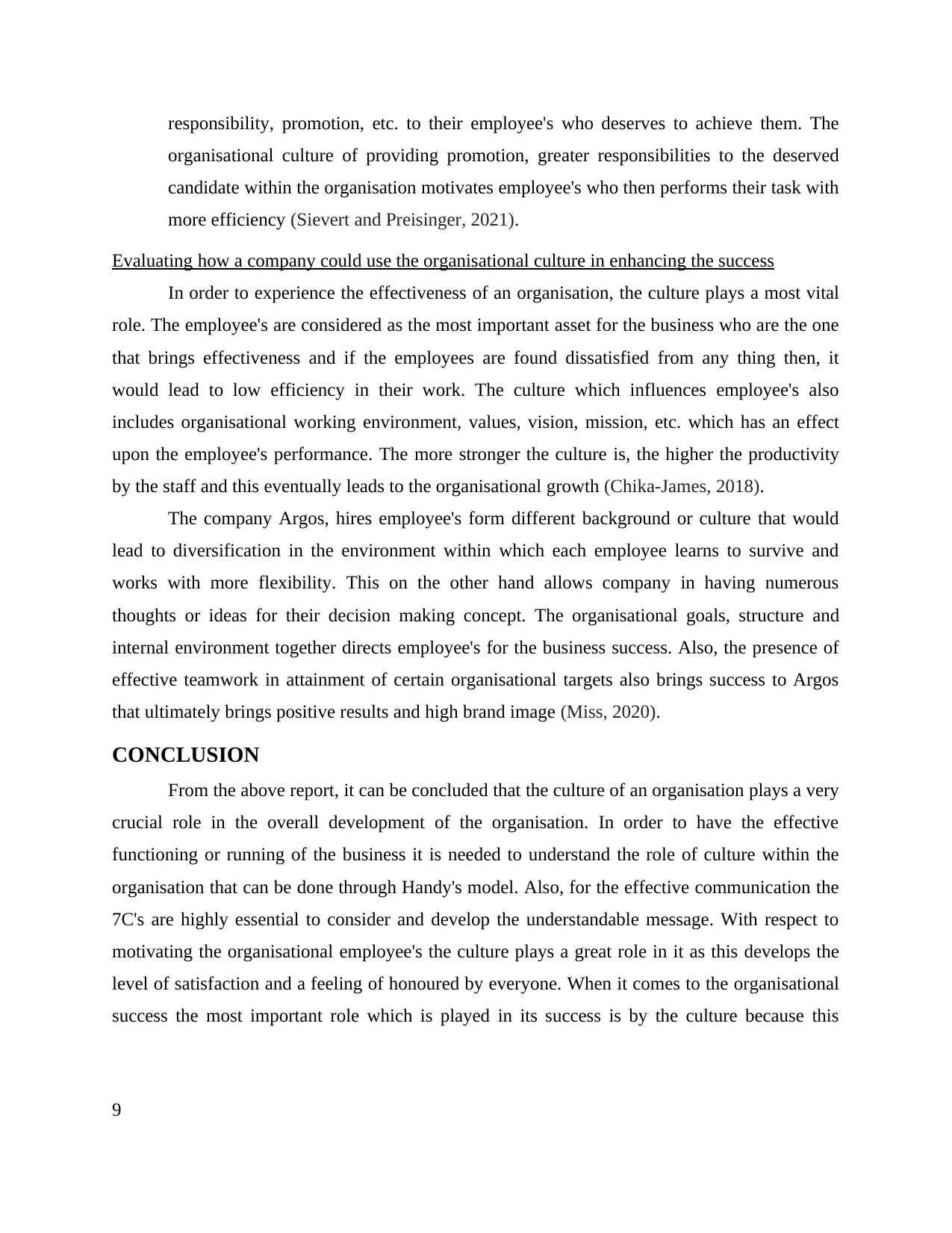
responsibility, promotion, etc. to their employee's who deserves to achieve them. The
organisational culture of providing promotion, greater responsibilities to the deserved
candidate within the organisation motivates employee's who then performs their task with
more efficiency (Sievert and Preisinger, 2021).
Evaluating how a company could use the organisational culture in enhancing the success
In order to experience the effectiveness of an organisation, the culture plays a most vital
role. The employee's are considered as the most important asset for the business who are the one
that brings effectiveness and if the employees are found dissatisfied from any thing then, it
would lead to low efficiency in their work. The culture which influences employee's also
includes organisational working environment, values, vision, mission, etc. which has an effect
upon the employee's performance. The more stronger the culture is, the higher the productivity
by the staff and this eventually leads to the organisational growth (Chika-James, 2018).
The company Argos, hires employee's form different background or culture that would
lead to diversification in the environment within which each employee learns to survive and
works with more flexibility. This on the other hand allows company in having numerous
thoughts or ideas for their decision making concept. The organisational goals, structure and
internal environment together directs employee's for the business success. Also, the presence of
effective teamwork in attainment of certain organisational targets also brings success to Argos
that ultimately brings positive results and high brand image (Miss, 2020).
CONCLUSION
From the above report, it can be concluded that the culture of an organisation plays a very
crucial role in the overall development of the organisation. In order to have the effective
functioning or running of the business it is needed to understand the role of culture within the
organisation that can be done through Handy's model. Also, for the effective communication the
7C's are highly essential to consider and develop the understandable message. With respect to
motivating the organisational employee's the culture plays a great role in it as this develops the
level of satisfaction and a feeling of honoured by everyone. When it comes to the organisational
success the most important role which is played in its success is by the culture because this
9
organisational culture of providing promotion, greater responsibilities to the deserved
candidate within the organisation motivates employee's who then performs their task with
more efficiency (Sievert and Preisinger, 2021).
Evaluating how a company could use the organisational culture in enhancing the success
In order to experience the effectiveness of an organisation, the culture plays a most vital
role. The employee's are considered as the most important asset for the business who are the one
that brings effectiveness and if the employees are found dissatisfied from any thing then, it
would lead to low efficiency in their work. The culture which influences employee's also
includes organisational working environment, values, vision, mission, etc. which has an effect
upon the employee's performance. The more stronger the culture is, the higher the productivity
by the staff and this eventually leads to the organisational growth (Chika-James, 2018).
The company Argos, hires employee's form different background or culture that would
lead to diversification in the environment within which each employee learns to survive and
works with more flexibility. This on the other hand allows company in having numerous
thoughts or ideas for their decision making concept. The organisational goals, structure and
internal environment together directs employee's for the business success. Also, the presence of
effective teamwork in attainment of certain organisational targets also brings success to Argos
that ultimately brings positive results and high brand image (Miss, 2020).
CONCLUSION
From the above report, it can be concluded that the culture of an organisation plays a very
crucial role in the overall development of the organisation. In order to have the effective
functioning or running of the business it is needed to understand the role of culture within the
organisation that can be done through Handy's model. Also, for the effective communication the
7C's are highly essential to consider and develop the understandable message. With respect to
motivating the organisational employee's the culture plays a great role in it as this develops the
level of satisfaction and a feeling of honoured by everyone. When it comes to the organisational
success the most important role which is played in its success is by the culture because this
9
⊘ This is a preview!⊘
Do you want full access?
Subscribe today to unlock all pages.

Trusted by 1+ million students worldwide
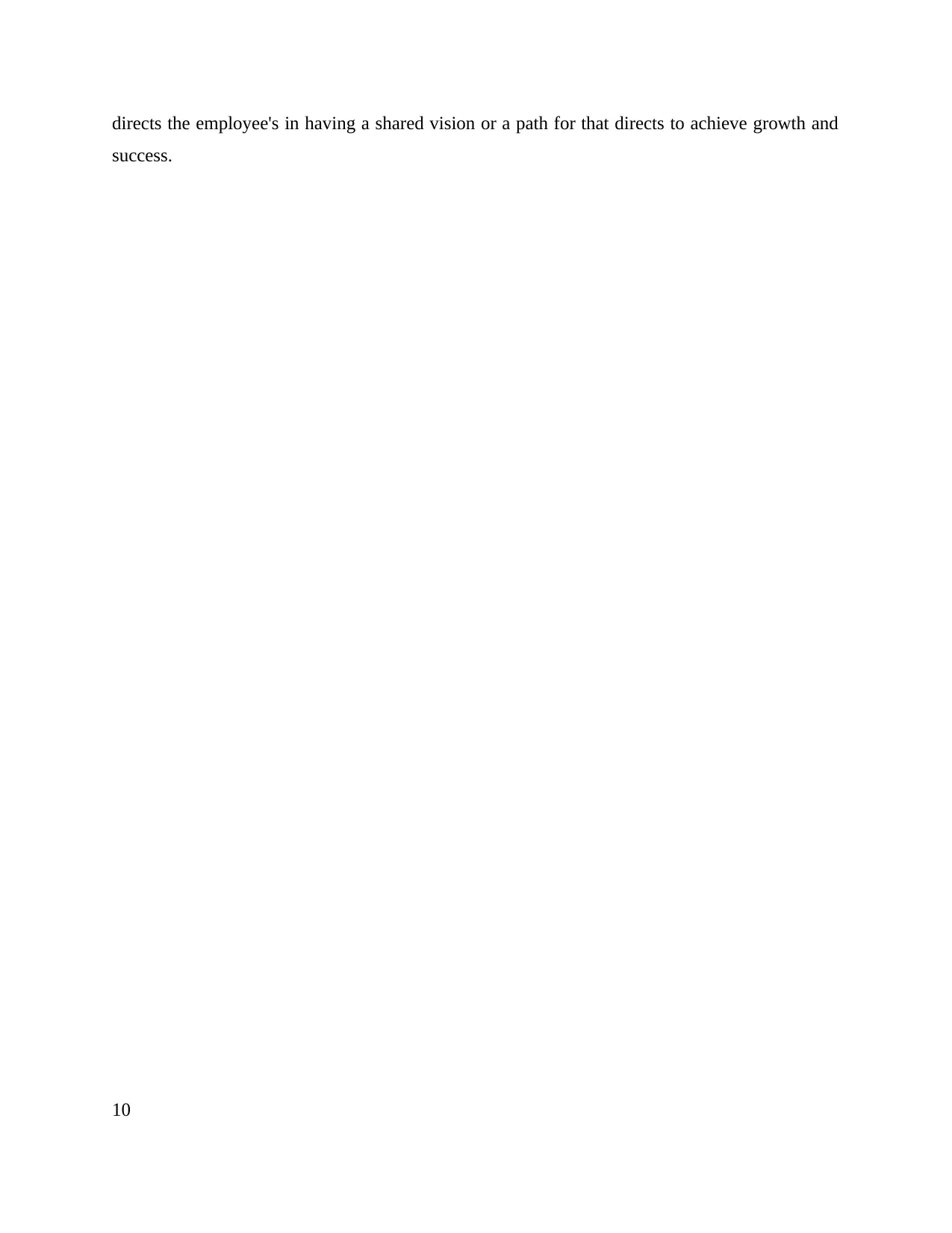
directs the employee's in having a shared vision or a path for that directs to achieve growth and
success.
10
success.
10
Paraphrase This Document
Need a fresh take? Get an instant paraphrase of this document with our AI Paraphraser
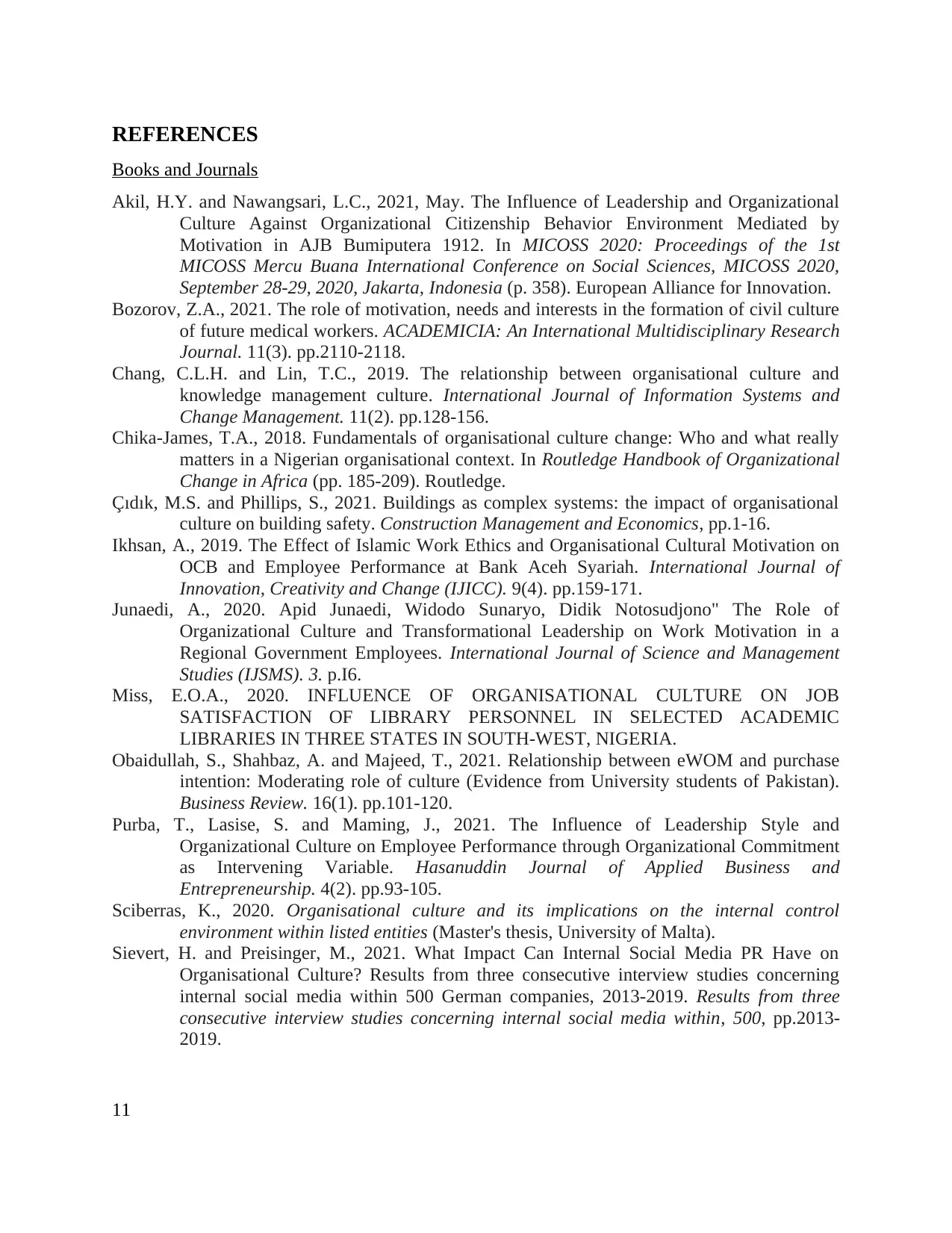
REFERENCES
Books and Journals
Akil, H.Y. and Nawangsari, L.C., 2021, May. The Influence of Leadership and Organizational
Culture Against Organizational Citizenship Behavior Environment Mediated by
Motivation in AJB Bumiputera 1912. In MICOSS 2020: Proceedings of the 1st
MICOSS Mercu Buana International Conference on Social Sciences, MICOSS 2020,
September 28-29, 2020, Jakarta, Indonesia (p. 358). European Alliance for Innovation.
Bozorov, Z.A., 2021. The role of motivation, needs and interests in the formation of civil culture
of future medical workers. ACADEMICIA: An International Multidisciplinary Research
Journal. 11(3). pp.2110-2118.
Chang, C.L.H. and Lin, T.C., 2019. The relationship between organisational culture and
knowledge management culture. International Journal of Information Systems and
Change Management. 11(2). pp.128-156.
Chika-James, T.A., 2018. Fundamentals of organisational culture change: Who and what really
matters in a Nigerian organisational context. In Routledge Handbook of Organizational
Change in Africa (pp. 185-209). Routledge.
Çıdık, M.S. and Phillips, S., 2021. Buildings as complex systems: the impact of organisational
culture on building safety. Construction Management and Economics, pp.1-16.
Ikhsan, A., 2019. The Effect of Islamic Work Ethics and Organisational Cultural Motivation on
OCB and Employee Performance at Bank Aceh Syariah. International Journal of
Innovation, Creativity and Change (IJICC). 9(4). pp.159-171.
Junaedi, A., 2020. Apid Junaedi, Widodo Sunaryo, Didik Notosudjono" The Role of
Organizational Culture and Transformational Leadership on Work Motivation in a
Regional Government Employees. International Journal of Science and Management
Studies (IJSMS). 3. p.I6.
Miss, E.O.A., 2020. INFLUENCE OF ORGANISATIONAL CULTURE ON JOB
SATISFACTION OF LIBRARY PERSONNEL IN SELECTED ACADEMIC
LIBRARIES IN THREE STATES IN SOUTH-WEST, NIGERIA.
Obaidullah, S., Shahbaz, A. and Majeed, T., 2021. Relationship between eWOM and purchase
intention: Moderating role of culture (Evidence from University students of Pakistan).
Business Review. 16(1). pp.101-120.
Purba, T., Lasise, S. and Maming, J., 2021. The Influence of Leadership Style and
Organizational Culture on Employee Performance through Organizational Commitment
as Intervening Variable. Hasanuddin Journal of Applied Business and
Entrepreneurship. 4(2). pp.93-105.
Sciberras, K., 2020. Organisational culture and its implications on the internal control
environment within listed entities (Master's thesis, University of Malta).
Sievert, H. and Preisinger, M., 2021. What Impact Can Internal Social Media PR Have on
Organisational Culture? Results from three consecutive interview studies concerning
internal social media within 500 German companies, 2013-2019. Results from three
consecutive interview studies concerning internal social media within, 500, pp.2013-
2019.
11
Books and Journals
Akil, H.Y. and Nawangsari, L.C., 2021, May. The Influence of Leadership and Organizational
Culture Against Organizational Citizenship Behavior Environment Mediated by
Motivation in AJB Bumiputera 1912. In MICOSS 2020: Proceedings of the 1st
MICOSS Mercu Buana International Conference on Social Sciences, MICOSS 2020,
September 28-29, 2020, Jakarta, Indonesia (p. 358). European Alliance for Innovation.
Bozorov, Z.A., 2021. The role of motivation, needs and interests in the formation of civil culture
of future medical workers. ACADEMICIA: An International Multidisciplinary Research
Journal. 11(3). pp.2110-2118.
Chang, C.L.H. and Lin, T.C., 2019. The relationship between organisational culture and
knowledge management culture. International Journal of Information Systems and
Change Management. 11(2). pp.128-156.
Chika-James, T.A., 2018. Fundamentals of organisational culture change: Who and what really
matters in a Nigerian organisational context. In Routledge Handbook of Organizational
Change in Africa (pp. 185-209). Routledge.
Çıdık, M.S. and Phillips, S., 2021. Buildings as complex systems: the impact of organisational
culture on building safety. Construction Management and Economics, pp.1-16.
Ikhsan, A., 2019. The Effect of Islamic Work Ethics and Organisational Cultural Motivation on
OCB and Employee Performance at Bank Aceh Syariah. International Journal of
Innovation, Creativity and Change (IJICC). 9(4). pp.159-171.
Junaedi, A., 2020. Apid Junaedi, Widodo Sunaryo, Didik Notosudjono" The Role of
Organizational Culture and Transformational Leadership on Work Motivation in a
Regional Government Employees. International Journal of Science and Management
Studies (IJSMS). 3. p.I6.
Miss, E.O.A., 2020. INFLUENCE OF ORGANISATIONAL CULTURE ON JOB
SATISFACTION OF LIBRARY PERSONNEL IN SELECTED ACADEMIC
LIBRARIES IN THREE STATES IN SOUTH-WEST, NIGERIA.
Obaidullah, S., Shahbaz, A. and Majeed, T., 2021. Relationship between eWOM and purchase
intention: Moderating role of culture (Evidence from University students of Pakistan).
Business Review. 16(1). pp.101-120.
Purba, T., Lasise, S. and Maming, J., 2021. The Influence of Leadership Style and
Organizational Culture on Employee Performance through Organizational Commitment
as Intervening Variable. Hasanuddin Journal of Applied Business and
Entrepreneurship. 4(2). pp.93-105.
Sciberras, K., 2020. Organisational culture and its implications on the internal control
environment within listed entities (Master's thesis, University of Malta).
Sievert, H. and Preisinger, M., 2021. What Impact Can Internal Social Media PR Have on
Organisational Culture? Results from three consecutive interview studies concerning
internal social media within 500 German companies, 2013-2019. Results from three
consecutive interview studies concerning internal social media within, 500, pp.2013-
2019.
11
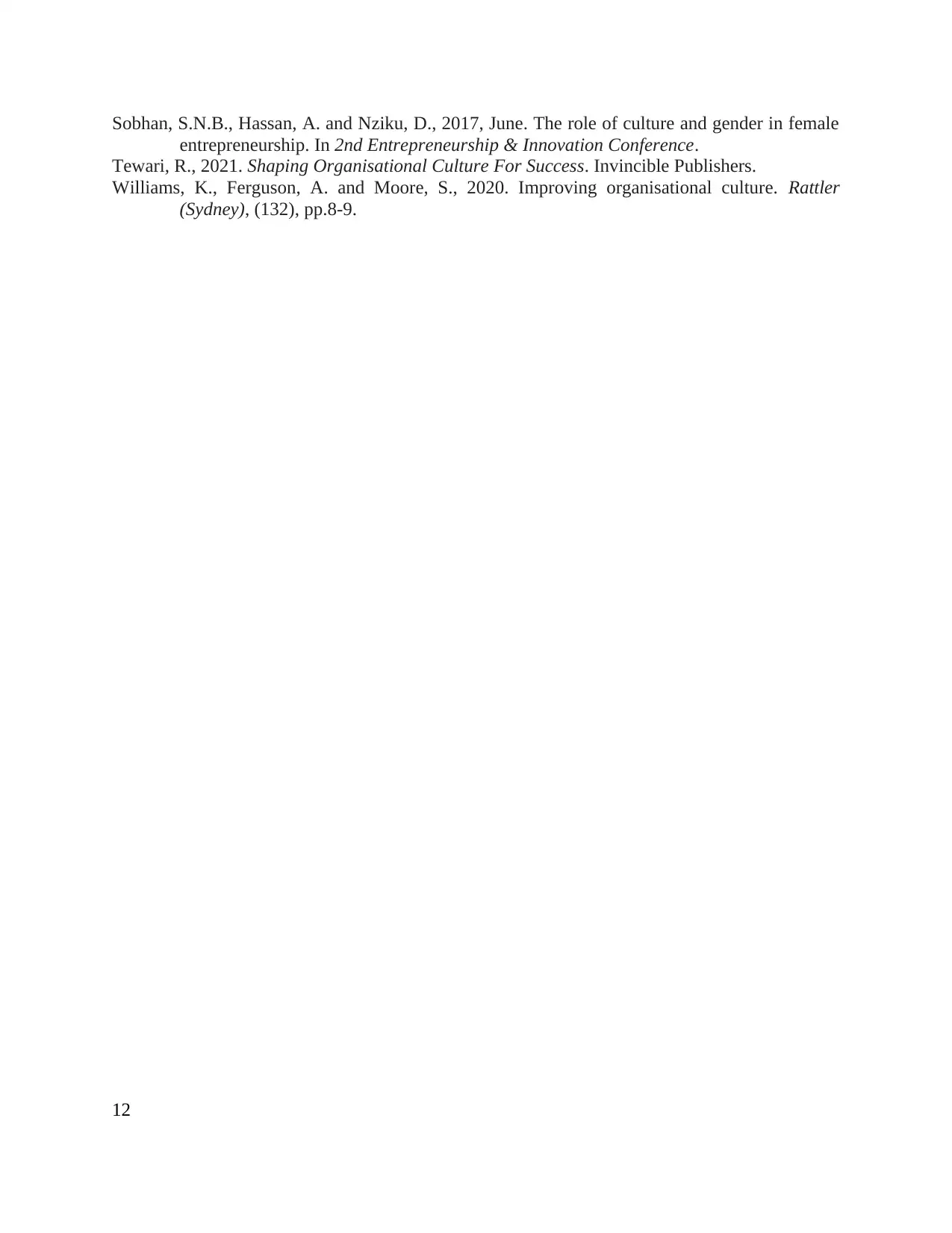
Sobhan, S.N.B., Hassan, A. and Nziku, D., 2017, June. The role of culture and gender in female
entrepreneurship. In 2nd Entrepreneurship & Innovation Conference.
Tewari, R., 2021. Shaping Organisational Culture For Success. Invincible Publishers.
Williams, K., Ferguson, A. and Moore, S., 2020. Improving organisational culture. Rattler
(Sydney), (132), pp.8-9.
12
entrepreneurship. In 2nd Entrepreneurship & Innovation Conference.
Tewari, R., 2021. Shaping Organisational Culture For Success. Invincible Publishers.
Williams, K., Ferguson, A. and Moore, S., 2020. Improving organisational culture. Rattler
(Sydney), (132), pp.8-9.
12
⊘ This is a preview!⊘
Do you want full access?
Subscribe today to unlock all pages.

Trusted by 1+ million students worldwide
1 out of 12
Related Documents
Your All-in-One AI-Powered Toolkit for Academic Success.
+13062052269
info@desklib.com
Available 24*7 on WhatsApp / Email
![[object Object]](/_next/static/media/star-bottom.7253800d.svg)
Unlock your academic potential
Copyright © 2020–2026 A2Z Services. All Rights Reserved. Developed and managed by ZUCOL.





